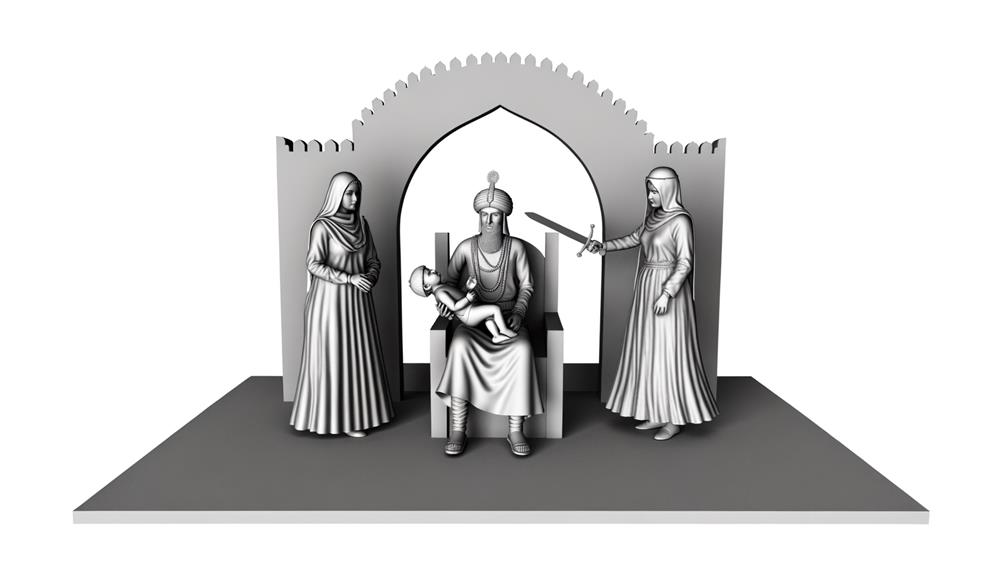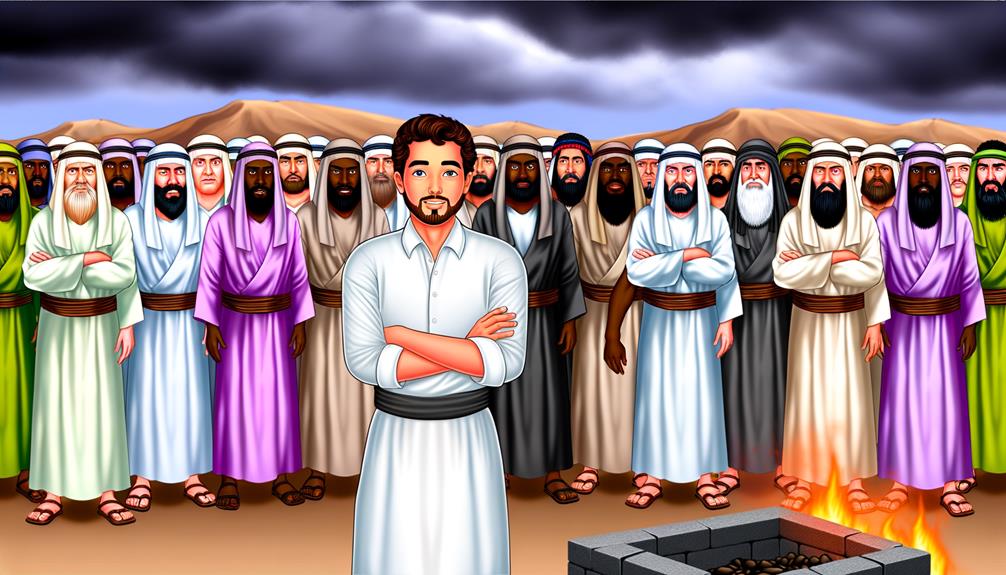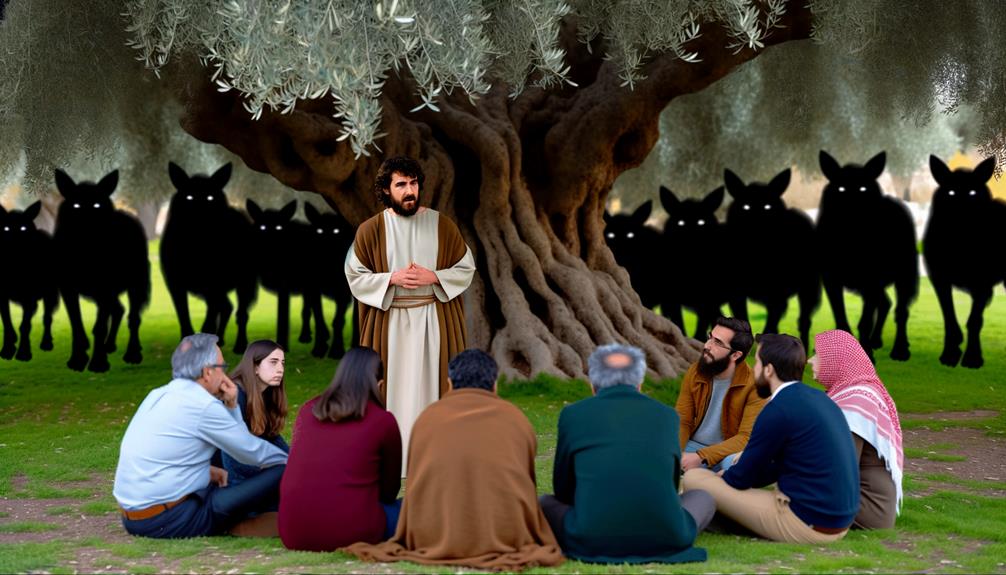Immerse yourself in biblical narratives showcasing discernment of spirits, from Solomon's wisdom to Paul's insights, and discover their timeless relevance.

Examples of Discerning of Spirits in the Bible
While you might think discerning of spirits is a concept too complex or mystical to grasp, the Bible presents it in quite relatable scenarios. Consider Solomon's wise judgment, or how Elijah confronted false prophets, offering clear, accessible examples.
Even Daniel's ability to interpret dreams and Paul's warnings against false apostles showcase this gift in action. As you explore these instances, you'll find that understanding the discernment of spirits isn't just about identifying the supernatural but also about recognizing truth and deception in daily life.
Let's embark on a journey to uncover the relevance of these biblical accounts in today's context.
Key Takeaways
- Biblical figures like Solomon and Daniel exemplify the power of spiritual discernment in identifying truth and confronting deception.
- Paul's teachings highlight the importance of discerning spirits to protect against false apostles and uphold doctrinal purity.
- The ability to discern spirits is vital in navigating spiritual conflict and safeguarding the integrity of the gospel.
- Community vigilance and critical evaluation of spiritual teachings are essential in preserving doctrinal purity amidst threats of spiritual deception.
Solomon's Wise Judgment

In analyzing Solomon's wise judgment, it's crucial to understand how his discernment exemplifies a profound spiritual insight, setting a precedent for wisdom in biblical narratives. Solomon's ruling, often heralded as the epitome of judicial wisdom, isn't merely a demonstration of intellectual acuity but a revelation of a deeper, spiritual discernment that intertwines with human nature's core facets, such as maternal instinct.
You'll find that Solomon's decision to suggest dividing the living child in two, offering a half to each woman claiming to be the mother, wasn't a literal intent but a strategic move to unveil the truth. This act of wisdom transcends mere intellectual judgment; it's a discernment that taps into the innate maternal instinct, expecting it to surface in the child's true mother. It's a test not of facts, but of heart, and therein lies its brilliance.
The scenario presented in the biblical account showcases Solomon's understanding that true justice often requires going beyond the surface, peering into the depths of human emotion and instinct. His reliance on maternal instinct as a touchstone for truth highlights a nuanced appreciation for the complexities of human nature, setting a standard for judicial wisdom that values emotional intelligence and spiritual insight.
Solomon's judgment, therefore, isn't just an isolated incident of keen intelligence and problem-solving. It's a testament to the integration of spiritual discernment with an understanding of human nature, particularly the powerful force of maternal instinct. This story educates you on the essence of wisdom—it's not just about knowing what's right but understanding the heart behind the actions.
Elijah Confronts False Prophets

Just as Solomon's judgment showcases the profound spiritual insight inherent in discerning truth, Elijah's confrontation with the false prophets similarly reveals a critical aspect of spiritual discernment in challenging and exposing falsehood. At the heart of this narrative is the Mount Carmel showdown, a dramatic confrontation that goes beyond mere theological dispute to underscore the power of true spiritual discernment.
In this encounter, Elijah stands as a solitary figure of truth against the multitude of prophets advocating Baal worship. This confrontation isn't merely about proving who the true God is; it's a profound demonstration of the ability to discern spirits in a context where falsehood had become institutionalized. Elijah's challenge to the prophets of Baal to call down fire from heaven serves as a tangible manifestation of spiritual realities, distinguishing between the divine and the deceitful.
The Baal worship confrontation encapsulates the essence of discerning of spirits. It isn't just about identifying false prophets; it's about recognizing the spiritual bankruptcy behind their claims. Elijah's discernment shines through not only in his bold challenge but also in his unwavering confidence in God's power to reveal the truth.
The outcome of this showdown—a miraculous display of divine fire consuming Elijah's offering—leaves no doubt as to where true spiritual power resides. This event not only discredits the prophets of Baal but also reaffirms the significance of discernment in navigating spiritual deception.
Elijah's confrontation with the false prophets at Mount Carmel thus serves as an instructive example of the critical role discernment plays in distinguishing truth from falsehood, emphasizing the necessity for spiritual insight in confronting and overcoming deceit.
Daniel Interprets Dreams

Daniel's ability to interpret dreams marks a pivotal moment in biblical narratives, demonstrating profound spiritual discernment amidst challenging circumstances. His interpretation skills not only reveal the immediate future but also showcase the power of divine wisdom over human understanding. The narratives surrounding Daniel highlight the complexity and importance of dream symbolism in communicating God's messages to His people.
- Dream of Nebuchadnezzar: Daniel interprets the king's dream of a statue made of various materials, predicting the rise and fall of empires. This interpretation required not just an understanding of dream symbolism but a profound connection with the divine.
- The Writing on the Wall: Although not a dream, this event underscores Daniel's unparalleled ability to decipher divine messages, as he interprets the mysterious writing that foretells the fall of the Babylonian empire.
- Daniel's Own Visions: These dreams, filled with complex symbolism about future events and the end times, underscore the depth of Daniel's spiritual insight and his role as a prophet.
- Interpreting for Belshazzar: Daniel interprets another dream for Nebuchadnezzar's successor, further solidifying his reputation as God's interpreter of mysteries.
Daniel's interpretation skills aren't just acts of deciphering complex symbols; they're manifestations of his deep spiritual connection and discernment. His interactions with dreams reveal a multifaceted approach to understanding God's will, emphasizing that true insight comes from a profound relationship with the divine. In analyzing Daniel's role, it's clear that dream symbolism serves as a bridge between the human and the divine, with interpretation skills acting as the key to unlocking these profound messages.
Jesus Identifies Demonic Influence

Throughout the Gospels, Jesus demonstrates an acute ability to discern and identify demonic influences, setting a precedent for understanding spiritual warfare. His encounters with evil spirits aren't just historical anecdotes; they provide critical insights into the nature of spiritual conflict. Jesus' divine insight allowed Him to see beyond the physical symptoms of possession, recognizing the spiritual oppression at work. This discernment is a cornerstone in the study of spiritual warfare, showcasing the necessity of a profound spiritual awareness to identify and combat demonic influence.
You'll notice that Jesus often confronted demons with authority and knowledge that bewildered onlookers. His confrontations weren't just about healing the physically or mentally afflicted but were deeper demonstrations of His power over the forces of darkness. This authority came from His divine insight, an integral aspect of His ministry on Earth. By studying these encounters, you learn that discerning spirits isn't solely about recognizing the presence of evil but also understanding the power and authority available to believers to overcome this evil.
Moreover, Jesus' interactions with demonic forces weren't marked by fear or hesitation. Instead, they exemplified confidence and authority. This teaches you the importance of faith and the power of God's word in spiritual warfare. Jesus' approach underscores that discernment isn't passive but requires active engagement and faith in God's power.
In essence, Jesus' ability to identify demonic influence sets a foundational example for believers. It emphasizes the need for divine insight and the authority believers hold over spiritual adversaries. Understanding these principles is vital for effectively engaging in spiritual warfare, equipped with the knowledge and faith demonstrated by Jesus.
Paul's Warning Against False Apostles

Paul's admonitions about false apostles in his letters serve as a vital warning, emphasizing the necessity for believers to discern spiritual truth amidst deception. He underscores the importance of apostolic authenticity and alerts the early Christians to the perils of spiritual deception. Through his insights, you're encouraged to critically evaluate the spiritual integrity of those who claim apostolic authority. Paul's words aren't just historical footnotes; they're a blueprint for safeguarding the church's doctrinal purity.
- Paul's discernment: He identifies false apostles as deceitful workers masquerading as apostles of Christ, showcasing an early church grappling with spiritual deception.
- Apostolic authenticity: Paul defends his apostleship not for personal gain but as a testament to the genuine gospel, contrasting his motives with those of the impostors.
- Spiritual deception: He warns of 'another Jesus,' 'a different spirit,' and 'a different gospel,' highlighting the subtlety and danger of spiritual deceit.
- Call to vigilance: Paul's appeal to the Corinthians to exercise discernment reflects a broader call for all believers to be vigilant against false teachings.
Your understanding of these elements is crucial. Paul's confrontation with false apostles isn't merely a historical account; it's a cautionary tale that resonates through the ages. It challenges you to scrutinize the credentials and teachings of those who claim spiritual authority, ensuring they align with the core tenets of the Christian faith. In doing so, you uphold the integrity of the gospel, guarding against the insidious nature of spiritual deception that seeks to undermine apostolic authenticity.
Frequently Asked Questions
How Does One Develop the Gift of Discerning Spirits According to Biblical Teaching?
To develop the gift of discerning spirits, start with a strong prayer foundation. Engage deeply in prayer, as it's the bedrock for spiritual growth and sensitivity.
Spiritual maturity is also key; it doesn't happen overnight but through consistent study of scripture and living out your faith.
You'll find that as you grow in these areas, your ability to discern spirits according to biblical teachings will enhance, guiding you in your spiritual journey.
Are There Examples in the Bible Where Individuals Mistakenly Thought They Had the Gift of Discernment?
In the realm of spiritual gifts, distinguishing between true discernment and misinterpretation is crucial. Historical context and interpretation challenges often cloud judgment.
While the Bible doesn't explicitly highlight instances of false discernment, it does emphasize the need for wisdom and testing spirits (1 John 4:1). Analyzing these scriptures, you'll find that discernment's authenticity depends heavily on alignment with God's word, hinting at the complexities and responsibilities that come with this gift.
How Does the Modern Church View the Gift of Discernment of Spirits in the Context of Mental Health Issues?
Today, you'll find the modern church increasingly integrating mental health training with spiritual guidance. This approach helps in discerning the complexities of mental health issues through a spiritual lens.
You're encouraged to understand that spiritual discernment must coexist with psychological knowledge to effectively address individual needs. This balanced perspective ensures that spiritual gifts, like discernment of spirits, are applied wisely, avoiding misinterpretation of mental health conditions as solely spiritual matters.
What Are the Biblical Criteria for Differentiating Between True and False Discernment of Spirits?
Navigating the murky waters of discernment, you're tasked with separating wheat from chaff. Biblical criteria hinge on spiritual maturity and divine guidance.
True discernment blooms from a soil rich in faith and scripture, watered by prayer. False discernment, however, often springs from shallow grounds, lacking roots in divine truth.
Analytically, it's a journey where insight and wisdom guide you, ensuring your compass aligns with God's map, not mere human intuition.
Can Believers Today Expect to Receive the Gift of Discernment of Spirits, and How Is It Manifested in Contemporary Christian Practice?
You can indeed expect to receive the gift of discernment of spirits in today's world, where it plays a crucial role in spiritual warfare.
This gift manifests through heightened sensitivity to the presence of both holy and evil spirits, guiding believers in navigating their spiritual journeys.
Modern applications include discerning truth in teachings, making moral decisions, and identifying spiritual influences in environments, essential for living out a faith grounded in contemporary Christian practice.
Conclusion
In the tapestry of scripture, discernment emerges as a golden thread, weaving through stories of wisdom, confrontation, and revelation.
Solomon's judgment, Elijah's defiance, Daniel's insights, Jesus' perception, and Paul's caution illuminate this spiritual acuity's pivotal role.
Like a beacon in the fog, discernment guides the faithful through deception's murky waters, urging a navigation that's anchored in divine wisdom.
These narratives don't merely recount events; they serve as timeless compasses, directing souls towards truth amidst spiritual tumult.



Sign up